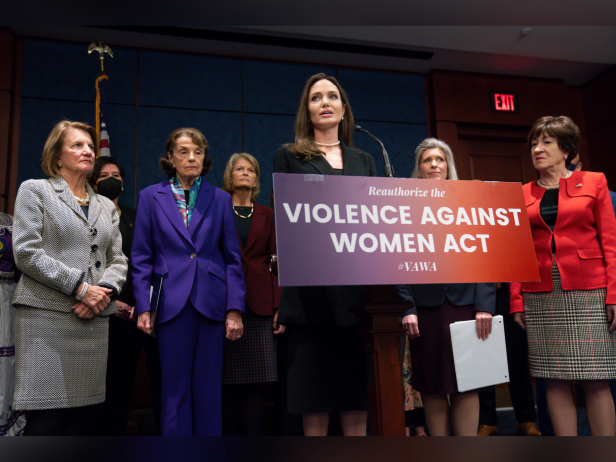How The Violence Against Women Act Changed America’s Views On Domestic & Sexual Abuse
“You’re a coward for raising a hand to a woman or child — and you’re complicit if you fail to condemn it,” said President Joe Biden, who helped pass the bill decades ago.

J. Scott Applewhite via AP
Nearly 30 years after its passage, the Violence Against Women Act has become a cornerstone in the United States’ national response to domestic and sexual abuse, which previously were often suffered in silence and publicly viewed as a private family issue.
On Sept. 13, 1994, President Bill Clinton signed the new crime bill into law with bipartisan support, providing victims more legal protections and expanding law enforcement officers and the court’s ability to fight everything from domestic and dating violence cases to sexual assault and stalking.
Known as VAWA, the bill’s “measures included requiring states to recognize protection orders from other states, federal prosecution of domestic violence and sexual-assault crimes that crossed state lines, incentives for states to require the mandatory arrest of abusers, and grants for programs such as educating judges on gender-motivated violence and funding sexual-assault and domestic violence crisis centers,” TIME reported.
VAWA paved the way for the creation of the Office on Violence Against Women (OVW), which oversees the Department of Justice-administered grants. The money has gone toward a variety of programs that also includes rape prevention and education, research on violence against indigenous women, and efforts to reduce sexual abuse of homeless youth and runaways.
According to a Department of Justice special report, between 1993 and 2010, the rate of intimate-partner violence dropped in the United States by 64 percent — a stunning change many experts believe was directly correlated to VAWA and how Americans began to view domestic violence as a result of its passage.
“Abuse is violent and ugly and today there is rightful public outrage over it,” President Joe Biden, who was chair of the U.S. Senate Judiciary Committee when he first introduced the Act in 1990, wrote in a 2014 TIME opinion piece about the importance of VAWA. “It matters that the American people have sent a clear message: You’re a coward for raising a hand to a woman or child — and you’re complicit if you fail to condemn it.”
The Violence Against Women Act was reauthorized in 2000, 2005, and 2013. After temporarily expiring in 2018 and 2019 during the federal government shutdown, VAWA was reauthorized in April 2019 with additional protections.
In March 2022, President Biden again reauthorized VAWA.
For more information on the various forms of domestic violence, and tools and resources for those who need them, visit NoExcuseForAbuse.com.









![Stacy Arthur [left] and James "Jim" Arthur [right] pictured smiling.](http://investigationdiscovery.sndimg.com/content/dam/images/investigationdiscovery/crimefeed/legacy/2023/01/the-playboy-murders-S1-E1-all-that-glitters.png.rend.hgtvcom.231.174.suffix/1673991794237.png)